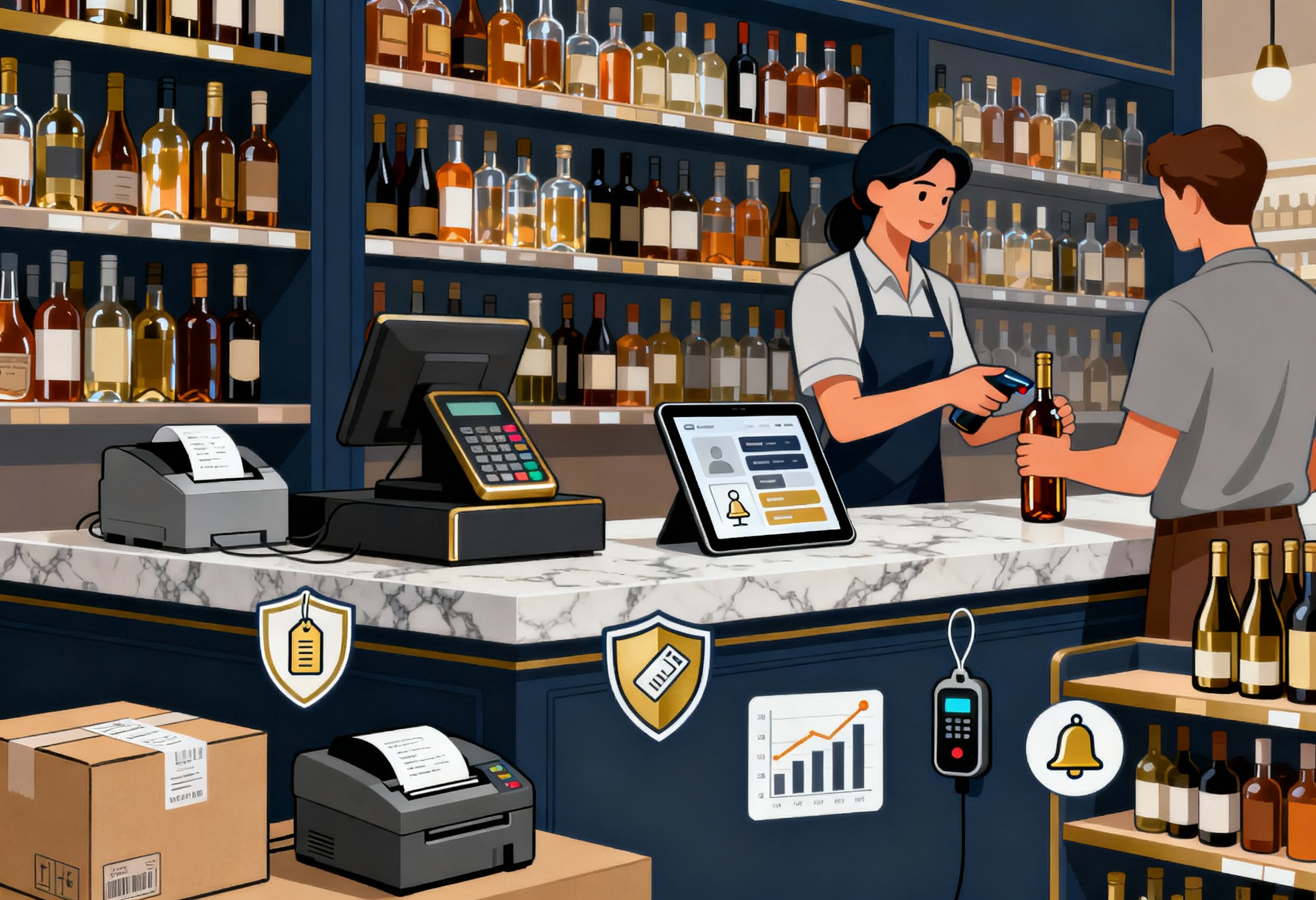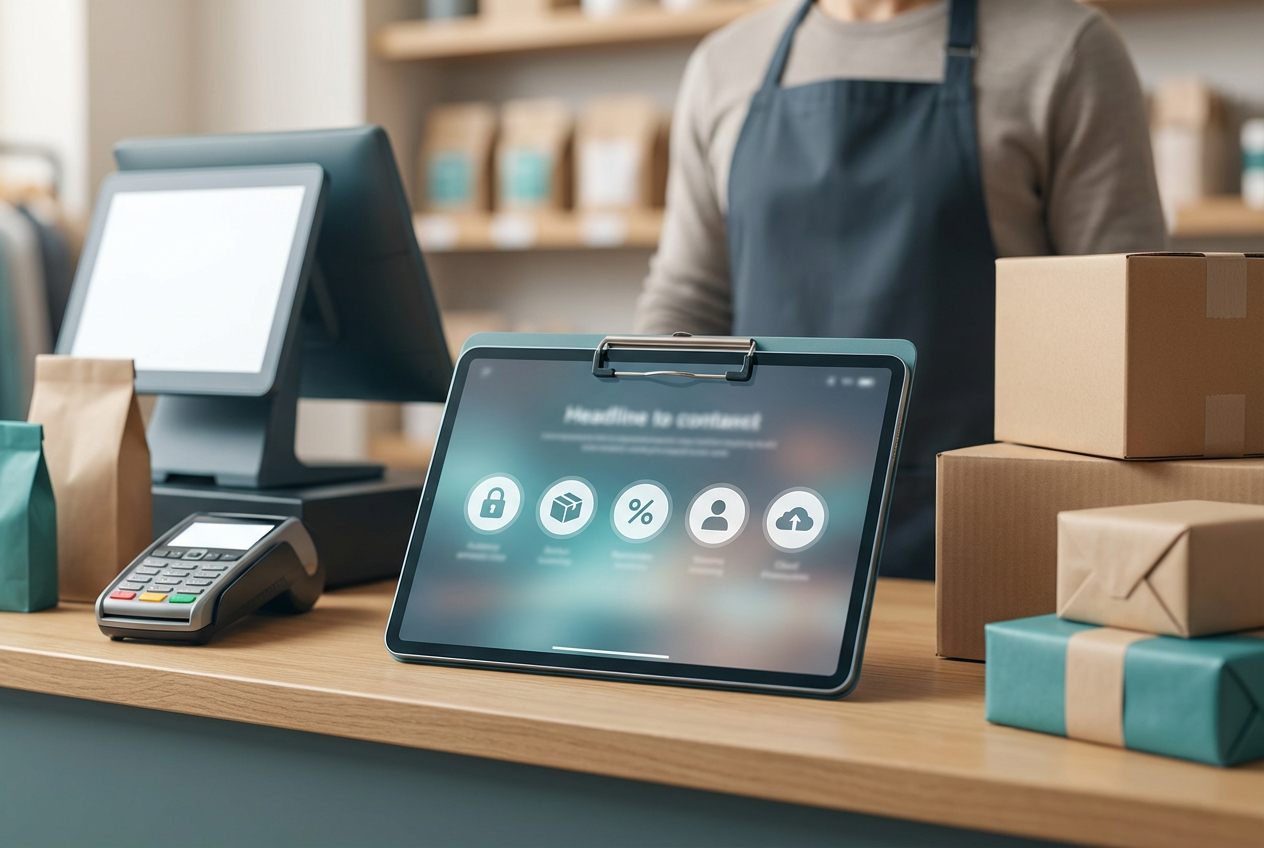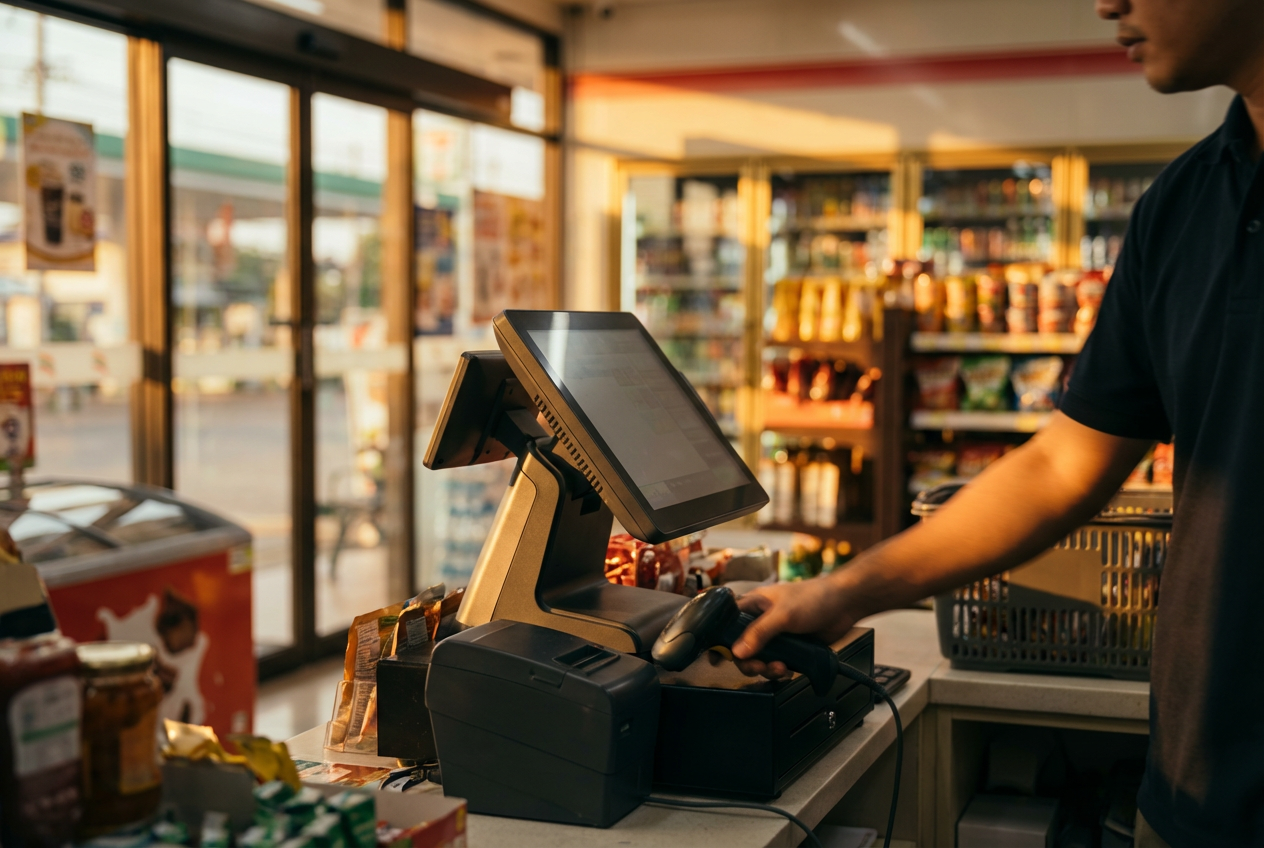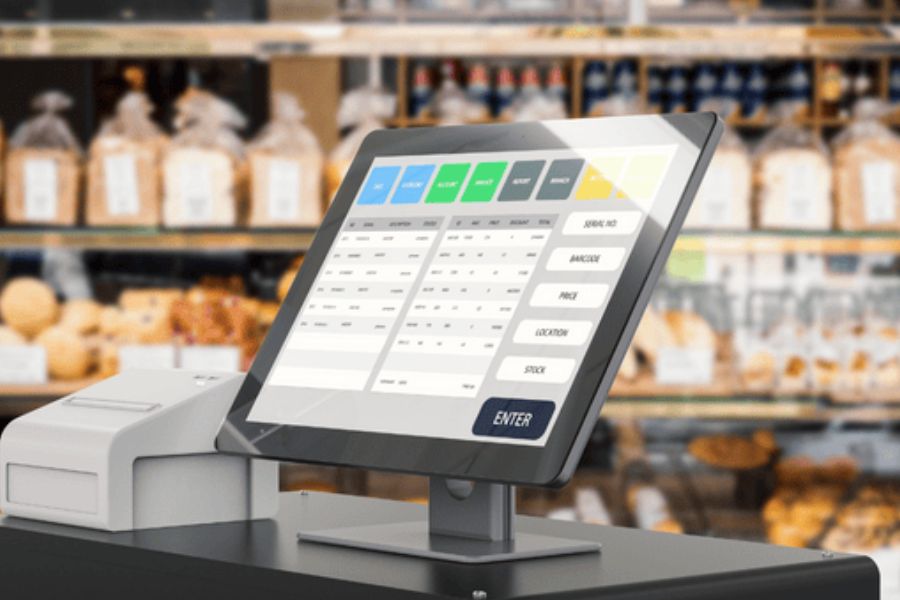Liquor retail involves strict regulation, tight margins, and constant shifts in buying behavior. Managing legal compliance, inventory movement, and customer demand depends on a point of sale for liquor stores that connects every operational detail in real time. A carefully designed system shapes data accuracy, reporting clarity, and staff productivity across all sales channels.
This article from ConnectPOS shares expert insights on selecting, evaluating, and applying POS solutions that help liquor retailers grow with confidence and precision.
Highlights:
- Liquor retail demands precise control over compliance, stock visibility, and pricing consistency. Point of sale for liquor stores must align with these pressures while managing complex licensing and taxation requirements.
- Evaluating and selecting a POS depends on clear business profiling, vendor reliability, and measurable ROI; data transparency and system scalability define long-term performance.
Unique Challenges in Liquor Retail
Liquor retail stands apart for its combination of strict regulation, operational complexity, and evolving consumer expectations. Each transaction is shaped by licensing laws, taxation policies, and age verification requirements that differ by jurisdiction.
These rules influence how inventory is purchased, labeled, and sold, requiring precision and traceability at every step. Stores often manage thousands of SKUs sourced from various suppliers, each with unique compliance conditions and shelf-life considerations. Maintaining accurate stock levels while avoiding spoilage or shortages demands clear data control and reliable systems.
The liquor market continues to expand as demand for premium and craft beverages rises. GlobeNewswire values the global alcoholic beverages industry at USD 543.13 billion in 2024, with a projected reach of USD 806.44 billion by 2033. Consumers now prioritize quality, authenticity, and local storytelling, seeking knowledgeable service and tailored recommendations. Independent retailers face growing competition from global brands and ecommerce platforms, reshaping how people discover and buy alcohol.

Sustaining success in this environment requires more than compliance. Liquor retailers must blend operational control with tailored experiences that reflect expertise and trust. Technology, particularly point of sale for liquor stores, enables this balance by connecting inventory accuracy, legal compliance, and customer engagement within one framework that supports both growth and integrity.
Core Features and Capabilities for Point Of Sale For Liquor Stores
A modern point of sale for liquor stores serves as the control center linking compliance, inventory, and customer transactions. This section examines two key layers of POS capability: essential features, which manage age checks, taxes, and inventory accuracy, and advanced features, which provide data intelligence, risk management, and secure integrations. Together, they create a technology foundation that keeps liquor operations compliant, data-driven, and ready for growth.
Essential Features for Modern Liquor Store POS
A point of sale for liquor stores must handle not only transactions but also respond to legal complexity, manage inventory volatility, and maintain accuracy in pricing and recordkeeping. Alcohol retail depends on compliance discipline and data precision. A capable POS ties operations, customer service, and accountability together, giving store owners full control over what happens at every counter and across every supplier relationship.
- Age Verification and ID Integration: Integrated ID scanning validates customer age automatically at checkout, supporting lawful sales and preventing costly violations. It maintains speed while preserving transparency in every recorded transaction.
- Automated Tax and Duty Calculation: The system applies local tax and duty rates by product category and region, removing manual calculation errors. It simplifies reporting for audits and financial reconciliation.
- Sales Restriction Controls: Automated rules prevent prohibited transactions, such as restricted hours or quantity limits. This keeps sales consistent with jurisdictional requirements while reducing staff oversight burden.
- Inventory and SKU Management: Liquor retailers often manage thousands of SKUs. Automated stock tracking connects purchasing, supplier data, and sales activity, helping stores maintain balance between high-demand and slow-moving items.
- Shrinkage and Fraud Detection: POS analytics detect irregularities like canceled transactions, voided receipts, or cash mismatches. Identifying these patterns early protects profit margins and operational integrity.
- Omnichannel and Order Management: As customer behavior shifts across in-store and online channels, integrated order management keeps pricing, availability, and sales history aligned. This continuity builds reliability and supports consistent service across every touchpoint.
Advanced Features for Liquor Store POS
Modern liquor stores require more than transaction processing. They demand technology that reads patterns, adapts to regulations, and connects data across every operational layer. A point of sale for liquor stores that supports intelligent forecasting, compliance control, and secure data exchange helps retailers sustain growth in a tightly governed market.
- Reporting, Analytics and Predictive Tools: Accurate reporting drives decisions grounded in sales behavior, pricing shifts, and supplier performance. Predictive models can project demand for specific product lines or seasonal categories, reducing overstock and missed revenue opportunities.
- Compliance and Risk Management Tools: Built-in compliance functions track regional liquor laws, store license conditions, and record-keeping standards. Alerts and audit-ready reports prevent non-compliant sales and preserve a verifiable data trail.
- Integration and APIs: Connectivity between POS, ecommerce, ERP, and accounting platforms strengthens data consistency. APIs allow information exchange between systems, supporting accurate financial tracking and supplier coordination.
- Security and Data Protection: Encryption, access controls, and real-time monitoring keep customer and payment data protected. Audit logs record staff actions and transaction adjustments, reinforcing accountability and safeguarding business continuity.
Evaluating and Selecting the Right Point Of Sale For Liquor Stores
Selecting the right POS for liquor retail is both an operational and financial decision that shapes long-term profitability. The evaluation process covers five key areas: defining store needs, setting data-based criteria, verifying vendor credibility, assessing integration fit, and analyzing cost versus return. These steps form a framework that aligns technology selection with compliance, performance, and growth objectives.
►►► Optimal solution set for businesses: Multi store POS, Next-gen POS, Inventory Management Software (MSI), Self Service, Automation, Backorders

Define Your Store Profile and Needs
Every liquor store operates under different pressures; some depend on neighborhood loyalty and boutique selections, others manage large-scale distribution or high-volume weekend sales.
Understanding the operational core means studying customer flow, sales rhythm, compliance obligations, and team capacity. A store that sells rare whiskies or imported wines will require deeper product data tracking and age verification precision than one that focuses on local beer sales.
A clear store profile sets direction for POS selection. It clarifies which system configurations align with daily operations, license requirements, and inventory flow. Establishing these needs early helps avoid wasted spending on unused functions or missing features during busy trading periods.
Evaluation Criteria
Selecting a POS for liquor retail demands a data-based approach that supports compliance, accuracy, and profit protection. Research from Business Plan Kit shows that well-managed stores still face 1–3% shrinkage, while weak inventory control can cut up to 25% of potential profit through spoilage, theft, or mismanagement. These losses underline the need for systems built around transparency and control.
A strong point of sale for liquor stores should track inventory in real time, record batch details, and manage expiry dates to prevent unseen losses. Automated tax and duty calculations reduce compliance errors that can affect licenses and margins. During peak trading periods, transaction stability becomes equally important, as high-volume checkout pressure often exposes system flaws.
Scalability must also guide the evaluation. A platform that expands with SKU growth, regional regulations, and connected sales channels protects future performance. Reviewing vendor histories and proven liquor retail deployments helps confirm whether the system can sustain long-term visibility, accuracy, and profitability.
Vendor Credibility and Case Studies
When evaluating vendor credibility and reviewing case studies, certain channels provide trustworthy evidence of performance and service quality.
Retailers may review vendor case studies like those on ConnectPOS’s website, which outline real-world deployments across various industries including liquor retail. These examples demonstrate how different retailers improved inventory accuracy, checkout performance, and omnichannel operations after adopting the system, helping liquor store owners assess how the platform performs under comparable retail conditions.
Industry-specific testimonials (on sites like Software Advice, Capterra) allow direct comparison across vendors by store size, SKU count, and channel mix. Retailers should evaluate vendor documentation of deployment scale, support metrics, and upgrade cadence, these aspects speak to long-term reliability more than headline feature lists.
Integration and Ecosystem Fit
Liquor retailers operate within a web of suppliers, payment gateways, and distribution channels. A point of sale for liquor stores should align with this ecosystem through open APIs and consistent data exchange, connecting accounting, CRM, ecommerce, and compliance modules into one operational flow. Integration reduces human error and allows financial and sales insights to stay consistent across departments.
Testing integration before deployment prevents data silos that often disrupt stock visibility or reporting accuracy. The POS should adapt to existing infrastructure rather than forcing complete system replacement, maintaining both agility and data continuity.
Cost and ROI Analysis
POS investment decisions extend beyond upfront software pricing. Hardware compatibility, maintenance fees, training time, and licensing renewals all affect total ownership cost. Liquor stores often work within tight margins and seasonal peaks, so assessing return on investment requires long-term data on efficiency, compliance stability, and customer retention impact.
Financial modeling should include projections of time saved in audits, error correction, and order fulfillment. Comparing cost against measurable gains in transaction accuracy and staff productivity highlights the system’s true business value , not just its sticker price.
Implementation Strategy and Best Practices For Point Of Sale For Liquor Stores
Rolling out a point of sale for liquor stores involves more than technical setup, it requires preparation, collaboration, and ongoing adjustment. A structured approach helps stores move from initial planning to smooth daily operations without business disruption.
- Planning and Phased Rollout: A clear deployment plan helps maintain stability during transition. Stores should assign defined responsibilities to managers, IT teams, and vendors, then test the POS in a single branch before extending it network-wide. Launching during lower sales periods reduces transaction disruptions and allows smoother adjustments.
- Data Migration and Cleanup: Accurate data forms the foundation of reliable POS performance. Before migration, stores should review and remove duplicate or outdated product and supplier records. Only verified data should enter the new system, ensuring consistent stock tracking and reporting accuracy after launch.
- Training and Change Management: Staff adoption shapes system success. Teams should receive hands-on training focused on key daily actions such as checkout, refunds, and ID checks. Simple digital guides and open feedback channels help identify friction points and improve day-to-day usage confidence.
- Monitoring and Optimization: Post-launch review is ongoing. Managers should track performance indicators like sales accuracy and transaction times to identify gaps. Adjusting inventory triggers, pricing rules, and screen layouts based on real usage data keeps the POS aligned with business goals.
ConnectPOS: A Powerful POS Solution for Liquor Retail
ConnectPOS is a unified cloud point of sale for liquor stores that need speed, compliance, and accurate stock control. It helps retailers handle high-volume transactions, complex product variations, and strict legal requirements such as age verification. Designed to support both physical and online operations, ConnectPOS keeps store data connected across locations and channels.
Key Highlights
- Real-time stock management: Provides low-stock alerts and demand forecasts, helping stores avoid product shortages during busy periods.
- Liquor-specific cataloging: Allows users to create wine, beer, or spirit variants by size, bottle, or case for easy classification and pricing.
- Flexible payment options: Accepts cash, cards, gift cards, and layaways to suit different customer preferences.
- Customer engagement tools: Includes AI facial recognition for identifying regular customers, self-checkout kiosks with ID scanning, and loyalty programs for rewards.
- Multi-store control: Lets business owners monitor inventory, sales, and performance across several branches from a single dashboard.
- E-commerce POS integration: Connects with major online platforms, enabling full O2O operations and online alcohol sales management.
- 24/7 multilingual support: Provides round-the-clock assistance during setup and daily use.
ConnectPOS liquor POS combines practical retail functions with compliance-ready tools, helping liquor stores operate with confidence and keep profits flowing.
FAQs: Point of Sale for Liquor Stores
How Does A POS Track Inventory Across Different Liquor Stores?
Each outlet reports live stock data to a shared dashboard. Managers can view sales, reorder levels, and product movement across branches without manual reconciliation.
What are the common mistakes during Liquor Store POS implementation?
Skipping staff training or data cleaning often causes errors. Testing with real scenarios before full rollout helps avoid pricing and inventory mismatches
How Can Point Of Sale For Liquor Stores Protect Customer And Payment Data?
Encryption, role-based access, and tokenized payments are standard security measures. Vendors should meet PCI DSS and local data protection requirements.
Can Liquor Store POS Data Support Marketing Or Product Decisions?
Yes. Transaction data helps identify top-selling products, peak hours, and customer preferences, guiding promotions or supplier negotiations.
Conclusion
The right point of sale for liquor stores shapes how liquor retailers maintain compliance, protect margins, and deliver dependable service. When sales, stock, and regulation data connect under one platform, daily operations gain both clarity and confidence.
ConnectPOS helps liquor stores reach that balance through purpose-built POS solutions that align accuracy with growth. Reach out to the ConnectPOS team to learn how your business can operate with greater control and consistency.
►►► Optimal solution set for businesses: Shopify POS, Magento POS, BigCommerce POS, WooCommerce POS, NetSuite POS, E-Commerce POS




